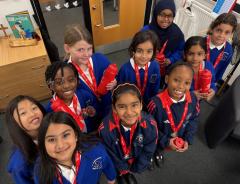Physical Education
Communication, Language and Literacy |
City Living |
Aspirations |
Celebrating Diversity |
At SJC Federation, we believe that all children should have access to a high quality, skills-based PE curriculum that ensures all pupils children become physically literate by developing the fundamental movement skills in a progressive and age/ability appropriate manner whilst recognising the individual needs of SEND or disadvantaged children.
We recognise the role that PE has to play in promoting a healthy, active lifestyle and ensure that our PE curriculum is complemented through our PSHE and Science curriculum to develop a holistic understanding of healthy living.
To engage children and ensure PE is relevant, SJC Federation takes advantage of its locality that includes world class sporting hubs such as two globally recognised, Premier League football clubs. Little Sport Coaching offer their expertise to support the delivery of high quality PE lessons, as well as offering a range of After School sport clubs, Holiday clubs and lunchtime sports activities.
Alongside professional sporting organisations, we have strong links with local high schools and engage in competitive activities with other primary schools. We celebrate the diverse range of sporting heroes from different backgrounds and communities to reflect upon the diversity within the Federation.

Purpose of study
A high-quality physical education curriculum inspires all pupils to succeed and excel in competitive sport and other physically demanding activities. It should provide opportunities for pupils to become physically confident in a way which supports their health and fitness. Opportunities to compete in sport and other activities build character and help to embed values such as fairness and respect.

Aims
The national curriculum for physical education aims to ensure that all pupils:
· develop competence to excel in a broad range of physical activities
· are physically active for sustained periods of time
· engage in competitive sports and activities
· lead healthy, active lives

Subject content
EYFS
Gross and fine motor experiences develop incrementally throughout early childhood, starting with sensory explorations and the development of a child’s strength, co-ordination and positional awareness through tummy time, crawling and play movement with both objects and adults.
By creating games and providing opportunities for play both indoors and outdoors, adults can support children to develop their core strength, stability, balance, spatial awareness, co-ordination and agility.
Gross motor skills provide the foundation for developing healthy bodies and social and emotional well-being.
Fine motor control and precision helps with hand-eye co-ordination which is later linked to early literacy.
Repeated and varied opportunities to explore and play with small world activities, puzzles, arts and crafts and the practise of using small tools, with feedback and support from adults, allow children to develop proficiency, control and confidence.
KEY STAGE 1
Pupils should develop fundamental movement skills, become increasingly competent and confident and access a broad range of opportunities to extend their agility, balance and coordination, individually and with others. They should be able to engage in competitive (both against self and against others) and co-operative physical activities, in a range of increasingly challenging situations.
Pupils should be taught to:
- master basic movements including running, jumping, throwing and catching, as well as developing balance, agility and co-ordination, and begin to apply these in a range of activities
- participate in team games, developing simple tactics for attacking and defending
- perform dances using simple movement patterns
KEY STAGE 2
Pupils should continue to apply and develop a broader range of skills, learning how to use them in different ways and to link them to make actions and sequences of movement. They should enjoy communicating, collaborating and competing with each other. They should develop an understanding of how to improve in different physical activities and sports and learn how to evaluate and recognise their own success.
Pupils should be taught to:
- use running, jumping, throwing and catching in isolation and in combination
- play competitive games, modified where appropriate [for example, badminton, basketball, cricket, football, hockey, netball, rounders and tennis], and apply basic principles suitable for attacking and defending
- develop flexibility, strength, technique, control and balance [for example, through athletics and gymnastics]
- perform dances using a range of movement patterns
- take part in outdoor and adventurous activity challenges both individually and within a team
- compare their performances with previous ones and demonstrate improvement to achieve their personal best
Swimming and water safety
All schools must provide swimming instruction either in key stage 1 or key stage 2.
In particular, pupils should be taught to:
- swim competently, confidently and proficiently over a distance of at least 25 metres
- use a range of strokes effectively [for example, front crawl, backstroke and breaststroke]
- perform safe self-rescue in different water-based situations
Update Autumn 2025 : We recently reviewed our swimming ability in year four and realised we had quite a few children who could not swim as independently as we would like. So we decided to do something about it!
We will share our case study on this page shortly about how we built a swimming pool on site for two months to help our children stay afloat and thrive in the water!
After School Sports Clubs

You can book your child a place on a range of Sports Clubs through Little Sports Coaching.







